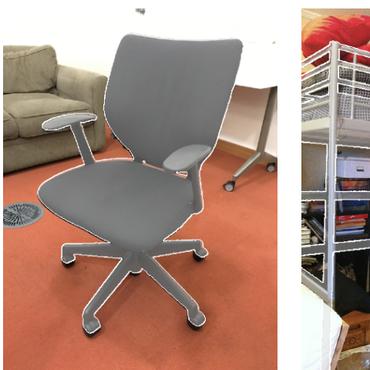Search Results for author: Joo-Hwee Lim
Found 11 papers, 4 papers with code
ON THE USE OF CONVOLUTIONAL AUTO-ENCODER FOR INCREMENTAL CLASSIFIER LEARNING IN CONTEXT AWARE ADVERTISEMENT
no code implementations • ICLR 2019 • Tin Lay Nwe, Shudong Xie, Balaji Nataraj, Yiqun Li, Joo-Hwee Lim
This paper focuses on classifying images displayed on the websites by incremental learning classifier with Deep Convolutional Neural Network (DCNN) especially for Context Aware Advertisement (CAA) framework.
Diffusion Time-step Curriculum for One Image to 3D Generation
1 code implementation • 6 Apr 2024 • Xuanyu Yi, Zike Wu, Qingshan Xu, Pan Zhou, Joo-Hwee Lim, Hanwang Zhang
Score distillation sampling~(SDS) has been widely adopted to overcome the absence of unseen views in reconstructing 3D objects from a \textbf{single} image.
Masked Diffusion with Task-awareness for Procedure Planning in Instructional Videos
1 code implementation • 14 Sep 2023 • Fen Fang, Yun Liu, Ali Koksal, Qianli Xu, Joo-Hwee Lim
The introduced mask acts akin to a task-oriented attention filter, enabling the diffusion/denoising process to concentrate on a subset of action types.
Invariant Training 2D-3D Joint Hard Samples for Few-Shot Point Cloud Recognition
no code implementations • ICCV 2023 • Xuanyu Yi, Jiajun Deng, Qianru Sun, Xian-Sheng Hua, Joo-Hwee Lim, Hanwang Zhang
We tackle the data scarcity challenge in few-shot point cloud recognition of 3D objects by using a joint prediction from a conventional 3D model and a well-trained 2D model.
Keyword-Aware Relative Spatio-Temporal Graph Networks for Video Question Answering
no code implementations • 25 Jul 2023 • Yi Cheng, Hehe Fan, Dongyun Lin, Ying Sun, Mohan Kankanhalli, Joo-Hwee Lim
The main challenge in video question answering (VideoQA) is to capture and understand the complex spatial and temporal relations between objects based on given questions.
Identifying Hard Noise in Long-Tailed Sample Distribution
1 code implementation • 27 Jul 2022 • Xuanyu Yi, Kaihua Tang, Xian-Sheng Hua, Joo-Hwee Lim, Hanwang Zhang
Such imbalanced training data makes a classifier less discriminative for the tail classes, whose previously "easy" noises are now turned into "hard" ones -- they are almost as outliers as the clean tail samples.
TAILOR: Teaching with Active and Incremental Learning for Object Registration
no code implementations • 24 May 2022 • Qianli Xu, Nicolas Gauthier, Wenyu Liang, Fen Fang, Hui Li Tan, Ying Sun, Yan Wu, Liyuan Li, Joo-Hwee Lim
When deploying a robot to a new task, one often has to train it to detect novel objects, which is time-consuming and labor-intensive.
Predicting Event Memorability from Contextual Visual Semantics
1 code implementation • NeurIPS 2021 • Qianli Xu, Fen Fang, Ana Molino, Vigneshwaran Subbaraju, Joo-Hwee Lim
In this study, we investigate factors that affect event memorability according to a cued recall process.
6D Pose Estimation with Correlation Fusion
no code implementations • 24 Sep 2019 • Yi Cheng, Hongyuan Zhu, Ying Sun, Cihan Acar, Wei Jing, Yan Wu, Liyuan Li, Cheston Tan, Joo-Hwee Lim
To our best knowledge, this is the first work to explore effective intra- and inter-modality fusion in 6D pose estimation.
Predicting Visual Context for Unsupervised Event Segmentation in Continuous Photo-streams
no code implementations • 7 Aug 2018 • Ana Garcia del Molino, Joo-Hwee Lim, Ah-Hwee Tan
Since motion cues are not available in continuous photo-streams, and annotations in lifelogging are scarce and costly, the frames are usually clustered into events by comparing the visual features between them in an unsupervised way.
Top-Down Regularization of Deep Belief Networks
no code implementations • NeurIPS 2013 • Hanlin Goh, Nicolas Thome, Matthieu Cord, Joo-Hwee Lim
We suggest a deep learning strategy that bridges the gap between the two phases, resulting in a three-phase learning procedure.








